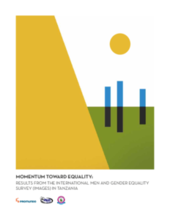The International Men and Gender Equality Survey (IMAGES) in Tanzania included a population-based quantitative survey with women and men aged 15 to 49, as well as qualitative research focused on adolescents and young adults. The International Men and Gender Equality Survey (IMAGES) is a comprehensive, multi-country study on men’s and women’s realities, practices, and attitudes with regard to gender norms, gender-equality policies, household dynamics, caregiving and fatherhood, domestic violence, sexual diversity, health, and economic stress, among other topics.
Among the findings from this survey, the report highlights the gendered differences in childcare responsibilities in households in Tanzania, with women taking on a majority of the caregiving tasks (particularly routine childcare tasks like diapering, feeding, and bathing). The survey also found that "approximately 20 percent of men and 17 percent of women grew up only or mostly with their mother" and that 11.1% of males and 16.3% of females grew up primarily in "other" forms of care (e.g., relatives, foster home, or orphanage).
The report outlines some findings related to violence experienced at home during childhood, including that "boys were more likely than girls to have been beaten so hard at home that it left a bruise or mark, while girls were 10 times more likely to have experienced sexual violence or coercion." Furthermore, says the report, "high proportions of men and women also recalled experiencing physical forms of punishment. Over four-fifths of respondents reported ever having been beaten with an object during their childhood — with just under half of both men and women reporting that this happened often."
Finally, the report also highlights findings related to "non-resident children," indicating that "twenty-seven percent of men and 22 percent of women reported having a biological child under 18 who does not live with them; this may be a child who is away at school, a child living with relatives, or a child from a previous relationship." In regards to non-resident children, the report concludes that "further research is needed to understand the specific circumstances of non-resident children."
The report ends with conclusions and recommendations for enabling increased gender equity and the transformation of "patriarchal norms and practices regarding women and girls’ value and roles in Tanzanian society."

